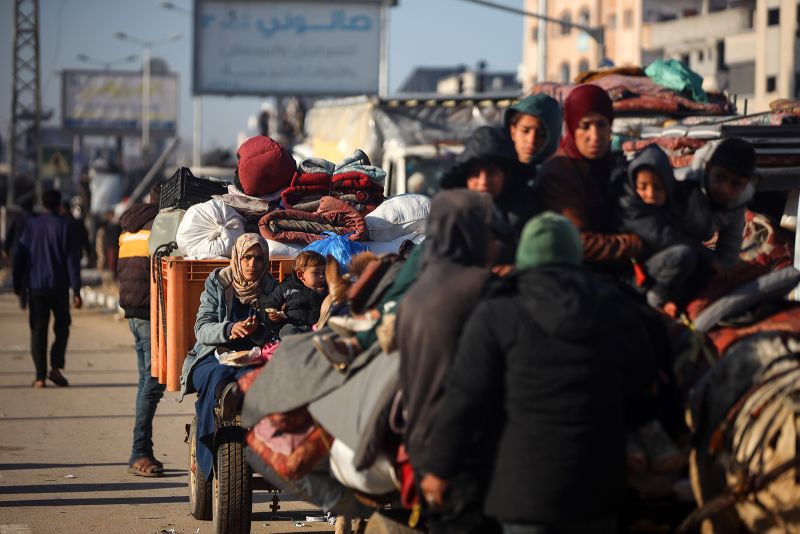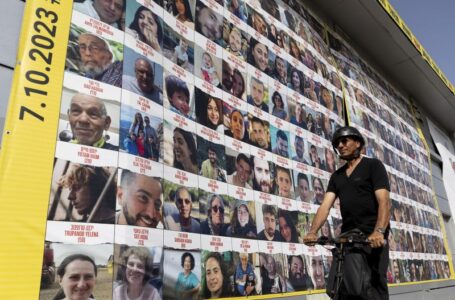Afghanistan food crisis deepens as aid cuts leave many living on ‘just bread and tea’
Palestinians return to devastated northern Gaza


Tens of thousands of displaced Gaza residents ended months of exile in temporary camps and began returning to what was left of their homes on Monday after Israel opened a corridor into the north of the battered enclave.
For days, they had sat out in the streets or on a beach with their mattresses, belongings, and water tanks, waiting for the checkpoint to open under the terms of the ceasefire and hostage release deal between Israel and Hamas.
“We miss our home. We have been living in tents for 470 days,” said Fadi Al Sinwar, from Gaza City on Sunday.
“We want to return home … Even though my house is destroyed. I miss my land and my place,” she said.
Their return was pushed back by 48 hours after Israel accused Hamas of breaching the terms of the ceasefire agreement over the release of hostage Arbel Yehud, delaying the opening of the Netzarim corridor that bisects the territory.
Hamas and Israel agreed to release more hostages, including Yehud, on Thursday and Saturday, the Israeli Prime Minister’s Office said on Sunday.
Under the agreement, Israel would allow Gazans to return to the north from Monday morning, according to the office.
The incident escalated tensions and threatened to derail the already fragile truce.
Those tensions heightened further on Saturday after President Donald Trump said he had discussed his plan to “clean out” Gaza with the king of Jordan and intended to raise the matter with Egyptian President Abdel Fattah el-Sisi.
The US president said he would like both Jordan and Egypt — which borders Gaza — to house hundreds of thousands of Palestinians either temporarily or “long term,” telling reporters onboard Air Force One, “because I’m looking at the whole Gaza Strip right now and it’s a mess, it’s a real mess.”
“It’s literally a demolition site right now,” Trump said of Gaza, much of which lies in ruins from relentless Israeli strikes during its 15-month war with Hamas. “I’d rather get involved with some of the Arab nations and build housing in a different location where I think they could maybe live in peace for a change.”
Trump’s Gaza plan strongly condemned
Both Jordan and Egypt rejected Trump’s idea to shift Palestinians out of the enclave, saying such a move would displace Palestinians from their homeland. Trump’s comments were also strongly condemned by Palestinian leaders and human rights groups, who denounced the forced relocation of residents as ethnic cleansing and a possible war crime.
“Our refusal of displacement is a steadfast position that will not change,” Jordan’s minister of foreign affairs said in a statement Sunday. Jordan is committed to “ensuring that Palestinians remain on their land,” Ayman Safadi said, adding: “Jordan is for Jordanians, and Palestine is for Palestinians.”
Jordan is already home to more than 2.39 million registered Palestinian refugees and more than half a million war-displaced Syrians, according to the United Nations.
Egypt has also taken in huge numbers of refugees from Syria, South Sudan, Libya, Iraq and other African nations, and has repeatedly opposed previous attempts to evacuate Gazan residents across its borders.
Egypt’s Ministry of Foreign Affairs reiterated the country’s position against “the displacement of Palestinians from their land through forced eviction” in a statement Sunday.
“Such actions threaten stability, risk extending the conflict further in the region, and undermine opportunities for peace and coexistence,” the statement added.
Trump’s comments appear to break with decades of US foreign policy, which has long emphasized a two-state solution for Israel and Palestine.
Specter of further mass displacement
But Trump’s idea to ultimately move residents to another country has only raised fears of further mass displacement among Palestinians.
The Palestinian Presidency said the plan “constitutes a blatant violation of red lines Palestinian leadership have consistently warned about.”
“The Palestinian people will never abandon their lands or their Holy Sites, and will not allow the repetition of the Nakba of 1948 and Naksa 1967,” the presidency said.
The movement of Palestinian refugees out of Gaza would evoke painful memories of the mass displacement that accompanied the creation of Israel in 1948. There are some 5.9 million Palestinian refugees worldwide, most of them descendants of the 700,000 people who were expelled or fled their homes during the Nakba, or catastrophe.
Hundreds of thousands more were displaced during the 1967 war, when Israel captured the West Bank from Jordan and Gaza from Egypt.
There are fears that if carried out, Trump’s plan would bring an end to any future prospect of Palestinian-Israeli peace based on a two-state solution.
Hamas in a statement said it will “categorically reject any plans to deport and displace them from their land,” and called on the US administration to “stop these proposals.”
Palestinian militant group Islamic Jihad also condemned Trump’s “reprehensible statements” and called the proposal “a continuation of the policy of denying the existence of the Palestinian people, their will and their rights.”
Human rights groups have also denounced the idea.
Human Rights Watch’s Israel and Palestine Director Omar Shakir said in a post on X that it “would amount to an alarming escalation in the ethnic cleansing of the Palestinian people and exponentially increase their suffering.”
US-based advocacy group the Council on American–Islamic Relations (CAIR), said Trump’s idea was “delusional and dangerous nonsense.”
“The Palestinian people are not willing to abandon Gaza, and neighboring countries are not willing to help Israel ethnically cleanse Gaza,” CAIR said on X.
Trump’s plan was supported by Israeli far-right politicians, however.
Israel’s Finance Minister Bezalel Smotrich, who has argued strenuously for Israel to re-establish Jewish settlements in Gaza abandoned under an Israeli order in 2005, quickly endorsed Trump’s comments.
“For years, politicians have proposed unrealistic solutions like dividing the land and establishing a Palestinian state, which endangered the existence and security of the only Jewish state in the world, and only led to bloodshed and suffering for many people,” he said in a statement released by his spokesperson.
“Only out-of-the-box thinking with new solutions will bring a peace and security solution.”
Chairman of the far-right Otzma Yehudit party, Itamar Ben Gvir, congratulated Trump on the proposal.
“I think that when the president of the world’s largest power himself raises this idea, then the Israeli government should implement encouraging immigration, now,” he said. Ben Gvir was Israel’s national security minister before resigning from Benjamin Netanyahu’s cabinet in protest at the Gaza ceasefire and hostage release deal.











